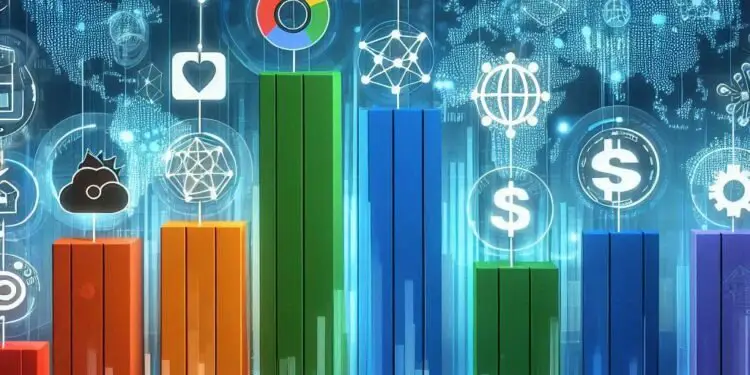Introduction
In the twenty first century, a handful of Big Tech corporations have no longer best changed how we speak, store, and devour facts — they’ve additionally come to be economic powerhouses shaping worldwide markets, labor traits, and innovation. Companies like Apple, Google (Alphabet), Amazon, Microsoft, Meta, and Tesla are now not truly tech businesses; they’re economic ecosystems influencing the whole thing from GDP to challenge advent and global exchange.
This article explores the economics of Big Tech, diving into how these groups generate sales, broaden at scale, dominate markets, and effect every countrywide and global economies.
What Defines a Big Tech Company?
The term “Big Tech” typically refers to the arena’s largest and most influential generation groups. These companies frequently percentage tendencies together with:
- Trillion-dollar marketplace capitalizations
- Global operations and consumer bases
- Massive R&D spending
- Data-centric company models
- Platform dominance (are searching for, social, cell, e-alternate)
Collectively, they’ve redefined what it approach to be a present day organization, mixing software, hardware, AI, logistics, and finance right into a unmarried high-performance model.
Revenue Models: How Big Tech Makes Money
1. Advertising-Based Models
Companies like Google and Meta (Facebook) depend intently on digital advertising and advertising.
- Google Ads remodeled $230 billion in 2023, comprising over 75% of Alphabet’s income.
- Meta’s Facebook and Instagram earn via targeted advertisements primarily based totally on user facts and engagement.
2. E-Commerce & Cloud Services
Amazon earns billions through:
- Online retail (product profits and 1/3-celebration provider commissions)
- Amazon Web Services (AWS) — its cloud platform generates over $eighty billion yearly.
3. Product Ecosystems
- Apple leverages hardware (iPhones, Macs), however its services department (iCloud, App Store, Apple Music) now contributes over 20% of universal revenue, with better margins.
4. Software & Licensing
Microsoft earns from:
- Cloud answers (Azure)
- Enterprise software program application (Office 365, Windows)
- LinkedIn Ads and pinnacle class services
💡 Many Big Tech companies function throughout more than one sectors, growing unique sales streams that insulate them from downturns in absolutely everyone industry.
Economies of Scale and Margins
Big Tech groups benefit from economies of scale, permitting them to:
- Produce goods or services at decrease in step with-unit prices
- Invest in infrastructure as soon as and monetize it time and again
- Expand globally with minimum incremental price
For instance:
- Building a are seeking for engine like Google or a cloud platform like AWS has a immoderate in advance charge — but each new person adds almost no fee, making income margins extremely high.
Apple had a gross margin of almost 40 4% in 2024 — top notch in conventional industries.
Market Power and Monopoly Concerns
🚨 Criticism of Big Tech:
- Dominating search, social media, and app ecosystems
- Acquiring or copying competition (e.G., Meta with Instagram & WhatsApp)
- Using platform dominance to undercut fighters (Amazon accused of favoring its very own products)
Regulatory Responses:
- Antitrust court instances in the U.S. And Europe
- Calls for breaking apart massive firms
- Privacy law (GDPR, California’s CCPA)
Big Tech’s energy has triggered global insurance debates approximately competition, consumer rights, and democracy itself.
Global Economic Impact
1 Employment
Big Tech corporations rent lots and lots right away and in a roundabout way via their structures, companions, and ecosystems.
- Amazon employs over 1.Five million people globally.
- Apple’s App Store supports over 2 million jobs in the U.S. Alone.
However, critics argue that:
- Many jobs are in low-revenue achievement centers
- Automation and AI can also reduce lengthy-time period employment
2. Stock Market Dominance
Tech giants make up a massive percentage of the S&P 500 and NASDAQ, which means:
- Their inventory charges closely have an effect on market indices
- Investors, pensions, and retirement accounts are tied to their overall performance
3. Foreign Direct Investment
Big Tech drives cross-border investments, starting records centers, research hubs, and local HQs round the world.
Their financial footprint is worldwide, impacting the entirety from community process markets to actual property demand in Silicon Valley or Dublin.
R&D and Innovation Drivers
Big Tech firms are the most important spenders on R&D globally.
- Amazon spent over $70 billion on R&D in 2023
- Google and Apple every spend over $25 billion every year
This funding fuels:
- Artificial Intelligence (AI)
- Quantum computing
- Augmented reality (AR)
- Autonomous vehicles
- Clean electricity & climate tech
These innovations ripple for the duration of industries, benefiting fitness, schooling, transportation, and communication.
Tax Avoidance and Economic Ethics
Despite massive earnings, many Big Tech corporations use tax loopholes and offshore systems to reduce their powerful tax costs.
Common Tactics:
- Shifting IP to tax havens like Ireland or Bermuda
- Declaring profits in low-tax jurisdictions
- Transfer pricing mechanisms
This has introduced about:
- Public backlash
- International tax reform efforts (e.G., the OECD’s worldwide minimal tax deal)
- Corporate pledges closer to greater “responsible capitalism”
Sustainability and Environmental Economics
Big Tech’s carbon footprint is huge — but so is its funding in sustainability.
Environmental Commitments:
- Google objectives for carbon-free operations by means of 2030
- Apple is already carbon-neutral in its worldwide corporate operations
- Microsoft plans to be carbon-horrific with the aid of 2030
Big Tech’s push toward inexperienced electricity and efficient data facilities sets the tone for different industries.
Risks and Future Outlook
📉 Economic Risks:
- Regulatory crackdowns
- Public accept as real with erosion
- Cybersecurity threats
- Market saturation in key products (e.G., smartphones)
📈 Opportunities:
- AI integration into all sectors
- Metaverse and spatial computing
- Expansion into fintech, healthtech, and edtech
- Global connectivity thru satellites and 5G
The destiny of Big Tech isn’t really in devices and classified ads — it’s in shaping the digital economic system and influencing how international places feature.
Conclusion
Big Tech organizations have grow to be economic engines some distance past their position as software program program or hardware manufacturers. They have an impact on markets, shape hard paintings trends, lead in innovation, and assignment regulators on a worldwide scale.
Understanding their financial dynamics — from sales fashions and scale advantages to regulation and sustainability — is critical for policymakers, consumers, and clients alike.
Whether you view them as visionaries or monopolists, one factor is clear: the economics of Big Tech will keep to form the global financial device for decades to return.
Key Takeaways:
- Big Tech companies generate sales thru commercials, offerings, hardware, and cloud structures.
- Their monetary have an effect on extends into jobs, investments, and even country wide coverage.
- They electricity innovation but additionally face criticism over market electricity and tax practices.
- Sustainability, AI, and law will outline the following phase of their evolution.













